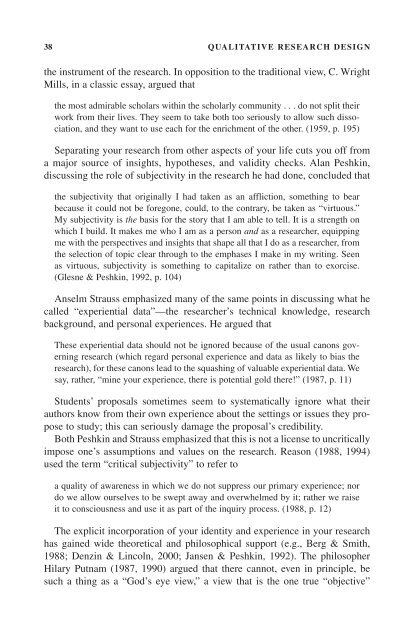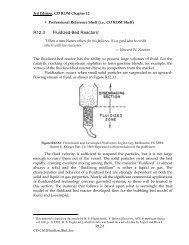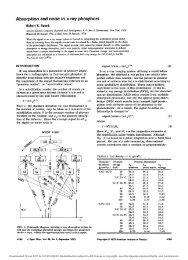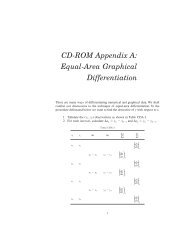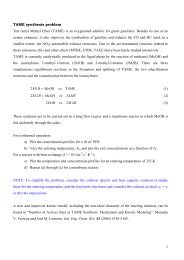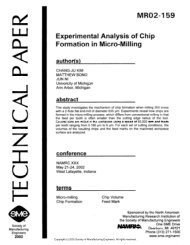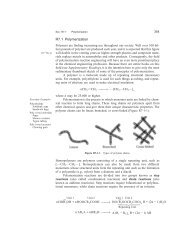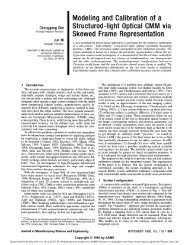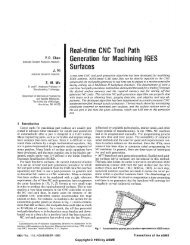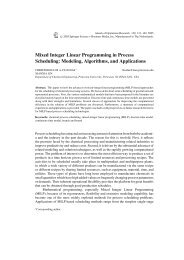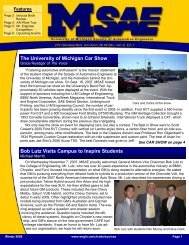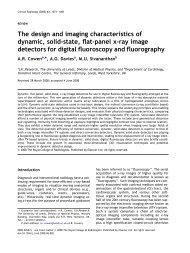Conceptual framework: What do you think is going on?
Conceptual framework: What do you think is going on?
Conceptual framework: What do you think is going on?
You also want an ePaper? Increase the reach of your titles
YUMPU automatically turns print PDFs into web optimized ePapers that Google loves.
03-Maxwell.qxd 10/1/2004 3:13 PM Page 38<br />
38 QUALITATIVE RESEARCH DESIGN<br />
the instrument of the research. In oppositi<strong>on</strong> to the traditi<strong>on</strong>al view, C. Wright<br />
Mills, in a classic essay, argued that<br />
the most admirable scholars within the scholarly community ...<str<strong>on</strong>g>do</str<strong>on</strong>g> not split their<br />
work from their lives. They seem to take both too seriously to allow such d<str<strong>on</strong>g>is</str<strong>on</strong>g>sociati<strong>on</strong>,<br />
and they want to use each for the enrichment of the other. (1959, p. 195)<br />
Separating <str<strong>on</strong>g>you</str<strong>on</strong>g>r research from other aspects of <str<strong>on</strong>g>you</str<strong>on</strong>g>r life cuts <str<strong>on</strong>g>you</str<strong>on</strong>g> off from<br />
a major source of insights, hypotheses, and validity checks. Alan Peshkin,<br />
d<str<strong>on</strong>g>is</str<strong>on</strong>g>cussing the role of subjectivity in the research he had <str<strong>on</strong>g>do</str<strong>on</strong>g>ne, c<strong>on</strong>cluded that<br />
the subjectivity that originally I had taken as an afflicti<strong>on</strong>, something to bear<br />
because it could not be foreg<strong>on</strong>e, could, to the c<strong>on</strong>trary, be taken as “virtuous.”<br />
My subjectivity <str<strong>on</strong>g>is</str<strong>on</strong>g> the bas<str<strong>on</strong>g>is</str<strong>on</strong>g> for the story that I am able to tell. It <str<strong>on</strong>g>is</str<strong>on</strong>g> a strength <strong>on</strong><br />
which I build. It makes me who I am as a pers<strong>on</strong> and as a researcher, equipping<br />
me with the perspectives and insights that shape all that I <str<strong>on</strong>g>do</str<strong>on</strong>g> as a researcher, from<br />
the selecti<strong>on</strong> of topic clear through to the emphases I make in my writing. Seen<br />
as virtuous, subjectivity <str<strong>on</strong>g>is</str<strong>on</strong>g> something to capitalize <strong>on</strong> rather than to exorc<str<strong>on</strong>g>is</str<strong>on</strong>g>e.<br />
(Glesne & Peshkin, 1992, p. 104)<br />
Anselm Strauss emphasized many of the same points in d<str<strong>on</strong>g>is</str<strong>on</strong>g>cussing what he<br />
called “experiential data”—the researcher’s technical knowledge, research<br />
background, and pers<strong>on</strong>al experiences. He argued that<br />
These experiential data should not be ignored because of the usual can<strong>on</strong>s governing<br />
research (which regard pers<strong>on</strong>al experience and data as likely to bias the<br />
research), for these can<strong>on</strong>s lead to the squashing of valuable experiential data. We<br />
say, rather, “mine <str<strong>on</strong>g>you</str<strong>on</strong>g>r experience, there <str<strong>on</strong>g>is</str<strong>on</strong>g> potential gold there!” (1987, p. 11)<br />
Students’ proposals sometimes seem to systematically ignore what their<br />
authors know from their own experience about the settings or <str<strong>on</strong>g>is</str<strong>on</strong>g>sues they propose<br />
to study; th<str<strong>on</strong>g>is</str<strong>on</strong>g> can seriously damage the proposal’s credibility.<br />
Both Peshkin and Strauss emphasized that th<str<strong>on</strong>g>is</str<strong>on</strong>g> <str<strong>on</strong>g>is</str<strong>on</strong>g> not a license to uncritically<br />
impose <strong>on</strong>e’s assumpti<strong>on</strong>s and values <strong>on</strong> the research. Reas<strong>on</strong> (1988, 1994)<br />
used the term “critical subjectivity” to refer to<br />
a quality of awareness in which we <str<strong>on</strong>g>do</str<strong>on</strong>g> not suppress our primary experience; nor<br />
<str<strong>on</strong>g>do</str<strong>on</strong>g> we allow ourselves to be swept away and overwhelmed by it; rather we ra<str<strong>on</strong>g>is</str<strong>on</strong>g>e<br />
it to c<strong>on</strong>sciousness and use it as part of the inquiry process. (1988, p. 12)<br />
The explicit incorporati<strong>on</strong> of <str<strong>on</strong>g>you</str<strong>on</strong>g>r identity and experience in <str<strong>on</strong>g>you</str<strong>on</strong>g>r research<br />
has gained wide theoretical and philosophical support (e.g., Berg & Smith,<br />
1988; Denzin & Lincoln, 2000; Jansen & Peshkin, 1992). The philosopher<br />
Hilary Putnam (1987, 1990) argued that there cannot, even in principle, be<br />
such a thing as a “God’s eye view,” a view that <str<strong>on</strong>g>is</str<strong>on</strong>g> the <strong>on</strong>e true “objective”


